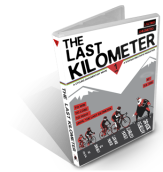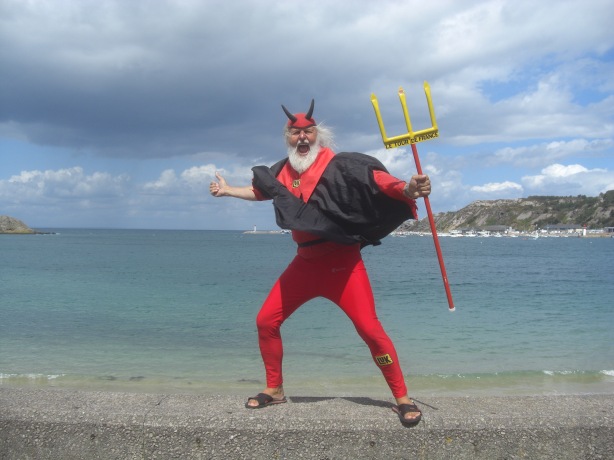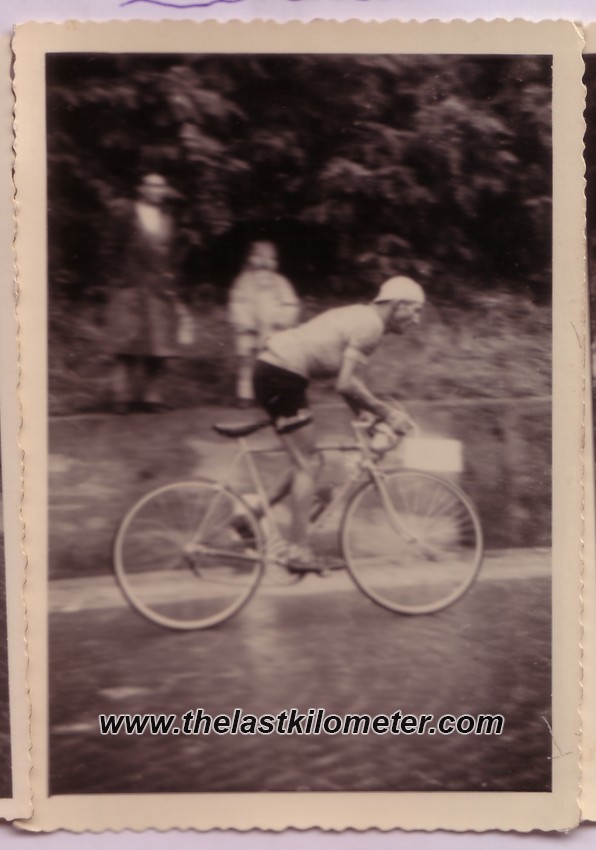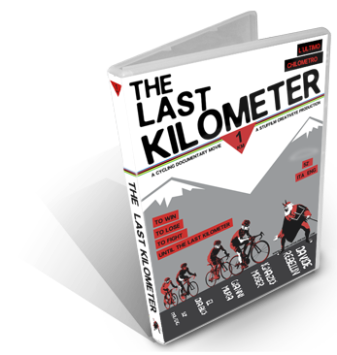Giro 1984 Cadutissima – In cima al groviglio di uomini si vede Marco Vitali – Nella foto c’è anche Francesco Moser (trovalo!)
Archive for February, 2013
Giro 1984 Cadutissima
Posted: February 18, 2013 in UncategorizedTags: 1984, bicycle, caduta, cycling, fall, giro, italia, moser
Giro d’Italia
Posted: February 13, 2013 in UncategorizedTags: battistini, ciclismo, cyclinmg, epoca, giro, heroil, italia, massignan, photo, storico, vintage
Doping…riflessioni di un corridore – dal sito davidecassani.it
Posted: February 11, 2013 in UncategorizedTags: blog, cassani, davide, facebook
condividiamo dal sito di Davide Cassani
Ormai siamo per tutti lo sport dei drogati, la feccia di questa società. Sei un ciclista? Sei un dopato. Correre in bicicletta, è sempre stata la mia passione, da quando sono un ragazzino ho dedicato la mia vita alla realizzazione di un sogno, correre il Giro d’Italia. Avevo 15 anni quando il sabato sera me ne tornavo a casa fregandomene degli sberleffi dei miei coetanei che, rincasando alle 9 di sera mi consideravano un mezzo rincoglionito. Avevo 16 anni quando nel branco ero l’unico che si rifiutava di prendere una sigaretta in bocca perchè non era quella che mi faceva diventare grande, avevo 18 anni quando allo sballo del vino facile e abbondante preferivo un bicchiere di spuma al cedro. Avevo 21 anni quando il mio sogno si è avverato e 35 quando mi sono reso conto che era meglio cambiar mestiere. Non è passato giorno che non abbia pensato alla mia professione che poi era anche la mia passione. Andare a letto alle 10 non è mai stato un sacrificio e non mi sentivo ferito neanche quando qualche idiota a bordo strada mi prendeva per il culo solo perchè ero l’ultimo, a mezzora dal primo. Ho gioito come un bambino tutte le volte che ho dedicato gambe e cuore ad un compagno di squadra più forte di me, ho toccato il cielo con un dito quelle poche volte che sono riuscito a vincere una corsa e ho pianto dal dolore non so quante volte quando, insanguinato e ferito, riprendevo la mia bicicletta per andare insieme all’ arrivo. Ho trascurato la mia famiglia, assecondato il mio istinto, seguito il mio cuore. Ho macinato 800.000 km, scalato salite impossibili. Ho lottato contro la neve della marmolada, combattuto l’afa sull’ Aubisque. Ho cercato sempre di portare la bicicletta all’arrivo e mi sono sempre sentito un eroe anche se per la maggior parte della gente ero un mezzo corridore. Da corridore non mi è mai importato niente del giudizio altrui perchè ero in armonia con me stesso. Come sono in armonia ora nonostante il mio sport sia trattato come il peggiore di tutti. I corridori? Delle merde di uomini che son capaci solo di doparsi. Che poi siano capaci di correre sotto la neve o con 40 gradi nessuno lo dice. Che il 50% di loro guadagni 40.000 lordi cioè 1 euro a km (un prof può arrivare a percorrere 40000 km in un anno) non frega niente a nessuno e che l’unico loro pensiero sia quello di aiutare un proprio compagno di squadra dimostrando una generosità che non è più di questo mondo, una dote che mai viene sottolineata.
No, siamo un branco di drogati. Punto e basta. Poi viene fuori l’operacion Puerto. 500 sportivi coinvolti, 250 sacche di sangue in frigorifero. Dal 2006 solo il nome di qualche ciclista è saltato fuori. Italiani, tedeschi, colombiani ma soprattutto solo ciclisti. Fuentes dice che è disposto a collegare i codici ai nomi ma nessuno gli chiede nulla. Il file del pc non viene toccato per il diritto alla privacy. Fuente dice che se parla salta lo sport in Spagna e per essere tranquilli qualcuno pensa bene di lasciare le sacche di sangue fuori dal figorifero cosi, essendo danneggiate, non servono più a nulla. Il presidente di una squadra di calcio accusa il suo predecessore dicendo che ha pagato a Fuentes centinaia di migliaia di euro. Notizia che va a finire nelle brevi. Esce il nome di una squadra di calcio italiana ma subito a dire che è il nome di un corridore (ovvio) dell’ est. Su un numero imprecisato di sacche c’era scritto “campionato d’Europa” e da quel che so io nel ciclismo non c’è tale manifestazione, nel calcio si. Fuentes dice di aver curato anche tennisti, calciatori, atleti dell’atletica leggera ecc ecc ma i nomi che vengono fuori di chi sono? Solo ciclisti. La wada si è presentata ai mondiali di calcio del 2006 ma sono stati rimandati a casa e nessuno ha mai detto nulla. Facile essere forti con i deboli e deboli con i forti. Cipollini era dopato? Non lo so, lo scopriremo ma vorrei sapere chi erano gli altri sportivi che tenevano sacche di sangue in quel frigorifero e soprattutto perchè io che sono un ciclista sono un dopato e tutti gli altri sono dei santi. Ma davvero pensate che il doping sia un problema solo del ciclismo? Ma se sono tra i pochi che accettano passaporto biologico, esami del sangue, reperibilità obbligatoria, perchè gli altri rifiutano tutto questo?
Ready?
Posted: February 10, 2013 in UncategorizedTags: bianche, bike, ciclismo, cycing, eroica, film, heroic, season, start, strade, vintage
Film review from www.thewashingmachinepost.net
Posted: February 9, 2013 in UncategorizedTags: bike, ciclismo, cycling, documentary, dvd, film, kilometer, last, movie, review
This has, in a convoluted manner, been a less than successful week, though if looked at from another point of view, it’s been pretty darned amazing. The less than successful bit started with ned boulting, though it would be most unfair to implicate him too deeply in the situation, for he is but the innocent bystander. At track centre in the sir chris hoy velodrome last saturday eve was the first time ned and i had met face to face; electronic conversation had been the precedent up till that point. and in the course of our glasgow tete-a-tete, i confessed to mr boulting that i had, in fact, never been to a velodrome before.

It is likely my own fault for giving the impression that there are few corners of the cycling world that have escaped my personal attentions. in fact there are probably a myriad of such. Ned was surprised.
But i then had the opportunity to view this rather fascinating italian cycle documentary entitled L’Ultimo Chilometro, a movie whose title sounds so much more authentic than its english translation The Last Kilometer.
I don’t mind admitting that i have every intention of sticking with the former. However, the movie concerns three entirely disparate individuals, one of whom is the son of Francesco Moser. I confess to being less than clued up on the extensive palmares of francsco moser. i do recall him being the progenitor of disc wheels and holder of the hour record set at altitude in mexico in 1984, and i believe i recallL aurent Fignon moaning endlessly about how the helicopter following moser in the Giro d’Italia was responsible for creating a hindering down-draught during the final time-trial.

All i have come across up till this point painted a less than flattering picture of the three-time winner of paris roubaix. however, perhaps not unsurprisingly, in a documentary at least in part concerning his son, he features regularly, and for me is the highlight of the whole affair. I want to be like him when i grow up, even down to buttoning my polo shirt to the neck.
Cool.


Ignazio moser at 20 is on the upward slope to a career as a professional cyclist, riding for the Trevigiani Dynamon Bottoli team, still learning the ins, outs and strategies of cycle racing, but now having transferred to the bmc developmental team and, in 2013, facing his first full season as a professional. While ignazio is on the very precipice of his career, davide rebellin, now 41 years old, is pretty much at the opposite end of the spectrum, still attempting to continue an illustrious and yet fallible career at the very top. though a rider who has achieved much, he was also the subject of a doping scandal that provided a consequent ban.
In one telling scene, Rebellin’s father, driving behind him during a training run in sunny italy, says “the cycling federation want davide to confess guilt. but what guilt? he never told me ‘dad, i did this or i did that’, so for me his crime doesn’t exist at all”. I have no idea whether Rebellin is guilty as charged or not, and very much to its credit, the movie does not follow this to any length, but it is telling that both rebellin and his father seem content to bury their heads in the sand over the matter.
The other two characters involved in this fast-paced drama are italian Tour de France correspondent Gianni Mura, who provides sagely comments about the tangible difference between the good old days and contemporary cycle racing. He, along with Francesco Moser provide the glue that creates the scenery in front of which this seasonal drama unfolds. and colouring this scenery from the point of view of a cycling fanatic, is Didi Senft, better known as il Diablo or Didi the devil. he’s the scraggy haired and bearded german who has been as much a part of recent tours and giros as the yellow and pink jerseys, jumping up and down at the roadside, waving a home-made trident at passing riders and team cars.
If i have a minor criticism of l’ultimo chilometro it is that switching sequences between Rebellin and Moser junior are often hard to distinguish, taking a few moments to realise just who is front and centre. But overall, the documentary is a singular triumph; director Paolo Casalis has kept his direction and narrative entirely transparent, allowing the protagonists considerable talking space to tell their own stories without secondary comment. Couple that with some particularly well paced filming, interviewing and editing, and the movie’s fifty plus minutes just flash by. Just the way cycle racing ought to be experienced.

Rebellin is a fish out of water, all the while hankering for the level of success that was once his; a man for whom you feel retirement from the sport will not sit at all easily on his shoulders. Ignazio Moser claims to have no wish to be judged by his father’s palmares, a rather forlorn hope in such a cycling obsessed country and with such a distinguished surname. Moser senior seems to have no illusion about that which sits ahead of his son saying “here in the vineyards we always need hands to work”.

The riders of old often used cycle racing as a means of escaping agricultural drudgery, and it may be that young Ignazio is following tradition, though it cannot be said that the trappings and surroundings during his interviews are even close to rudimentary or rustic. Rebellin too seems still to enjoy the fruits of his erstwhile success, but i fear more for his future than that of Ignazio Loser. L’ultimo Chilometro is a truly excellent window on italian cycling, commenting without making comment. If you speak italian, you can watch ‘au naturale; the rest of us must make do with english subtitles.
very, very good.
The Last Kilometer is available on dvd for €15.90 (£13.75) direct from www.thelastkilometer.com
friday 8th february 2013
WATCH FILM TRAILER:
Thanks to www.thewashingmachinepost.net for its enthusiastic review! Wow! We too, we could not use better words to present our own movie!
Didi Senft, El Diablo
Posted: February 7, 2013 in UncategorizedTags: diablo, didi, france, senft, tour
Chi ha creduto alle favole di Lance Armstrong
Posted: February 7, 2013 in UncategorizedTags: armstrong, doping, foot, gioranlismo, john, kimmage
Chi ha creduto alle favole di Lance Armstrong
di John Foot
da Internazionale, 30 Gennaio 3013
Il giornalismo non ha fatto una bella figura con la storia di Lance Armstrong. Per anni, la grande maggioranza dei giornalisti ha creduto, o ha fatto finta di credere, alla favola di Lance. Il ciclista bravo, che sopravvive al cancro e poi vince il Tour de France per sette volte. Sembrava un miracolo. Ma non lo era.
Pochi osavano dubitare di questa bella favola. Ci sono state due ragioni, in fondo, per questo fallimento totale dell’informazione. Una era la comodità. Lance vendeva giornali, libri, e faceva molta audience. È stato il ciclista più famoso di tutti i tempi. Aveva potentissimi sponsor. Aveva molto potere. Era molto più facile chiudere un occhio, o due. Era molto più facile dire che i francesi erano solo gelosi. Era molto più facile raccontare le imprese del cowboy.
L’altra ragione è stata puramente legale. Lance querelava tutti quelli che scrivevano qualcosa sul suo rapporto con il doping. Minacciava. Emarginava. In Inghilterra ha querelato con successo un giornale potente come il Sunday Times. E quindi, per quelli che volevano una vita facile, era meglio non pensare all’epo, al dottor Ferrari, al testosterone, alle sacche di sangue nel frigo del dottor Fuentes. Era meglio credere alla favola.
Ma per alcuni giornalisti questa strada non era quella giusta. Erano pochi, ma non hanno mollato. Sono stati messi in un angolo. Non potevano fare domande alle conferenze stampa. Ma continuavano a indagare. Come veri giornalisti. E piano piano, la verità è venuta fuori. Qualcuno parlava, ad esempio qualche ciclista coraggioso come Filippo Simeone. E qualche giudice indagava. Alla fine il cerchio intorno al Armstrong si è chiuso. Anche grazie a questi giornalisti francesi, inglesi, irlandesi.
Hanno anche un nome e cognome. David Walsh, Paul Kimmage, Pierre Ballester. Adesso questi reporter rilasciano interviste, e i loro libri vendono tantissimo. Ma poco tempo fa erano visti come dei pazzi che volevano solo distruggere il ciclismo. Invece non era così.
Erano gli unici che potevano salvare uno sport che ha vissuto per troppo tempo nell’ omertà. Il loro lavoro dovrebbe essere letto nelle scuole di giornalismo. Sono gli unici eroi di una squallida storia di inganni, bugie, corruzione, leccaculismo, sponsor, soldi, sangue. Una favola che e diventata un incubo.
Now also an Amazon!!!
Posted: February 2, 2013 in UncategorizedTags: amazon, documentary, film, kilometer, last
NOW YOU CAN BUY THE DVD ALSO ON AMAZON!
That can be a simpler, quicker and easier option for you, please just consider that Amazon DVD is a NTSC format disc (NTSC format is used in the United States, Canada, Japan…) even if it works also in Europe and other PAL countries. Moreover, Amazon DVD has no additional contents, you just have the subtitled film.
Click HERE to place your order! (or click here to see all buying options)






